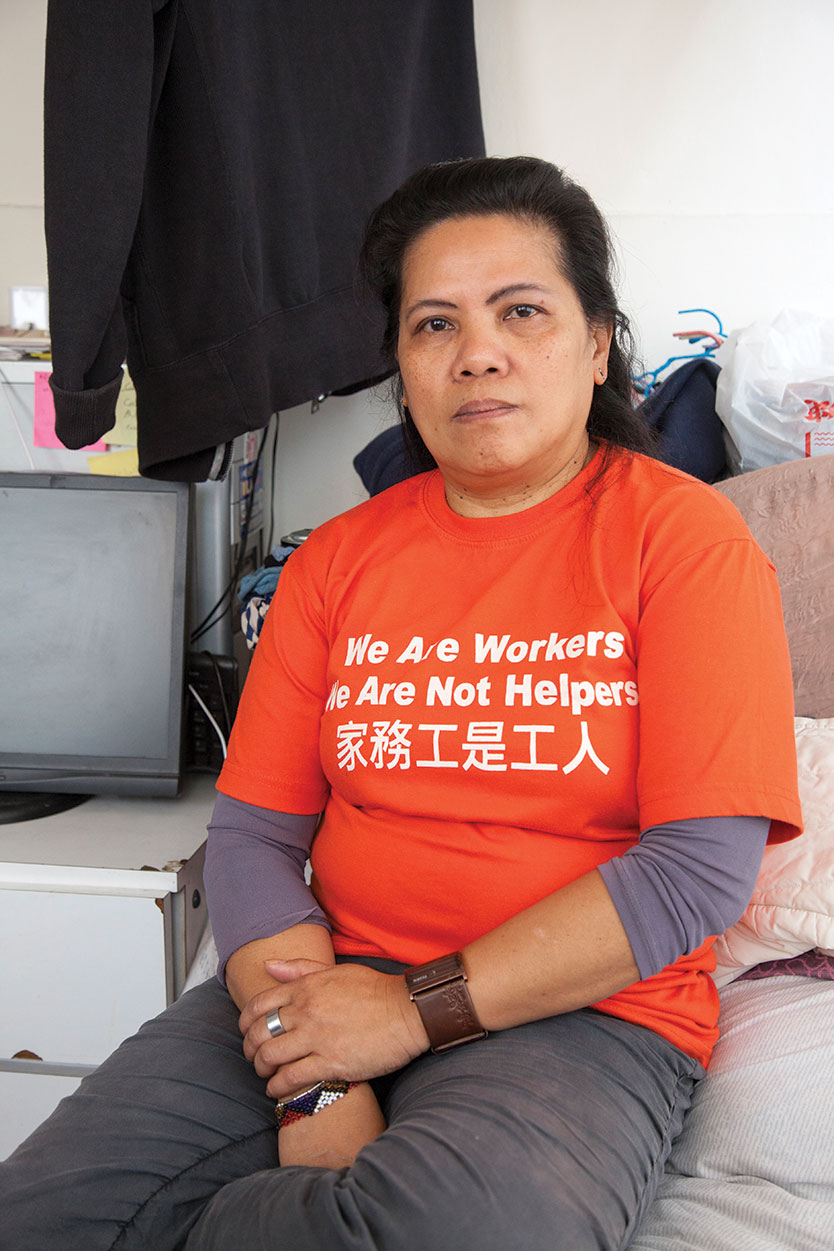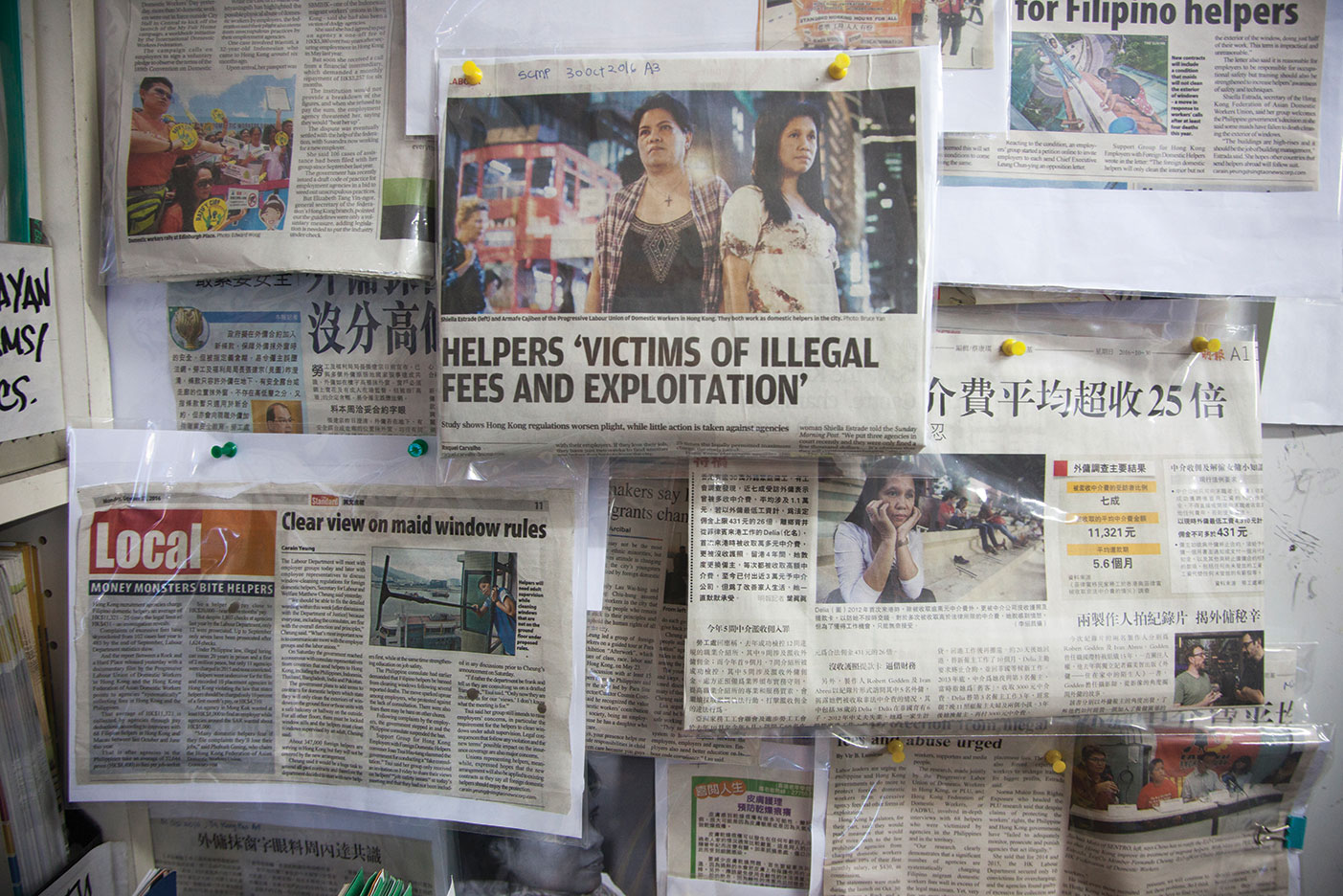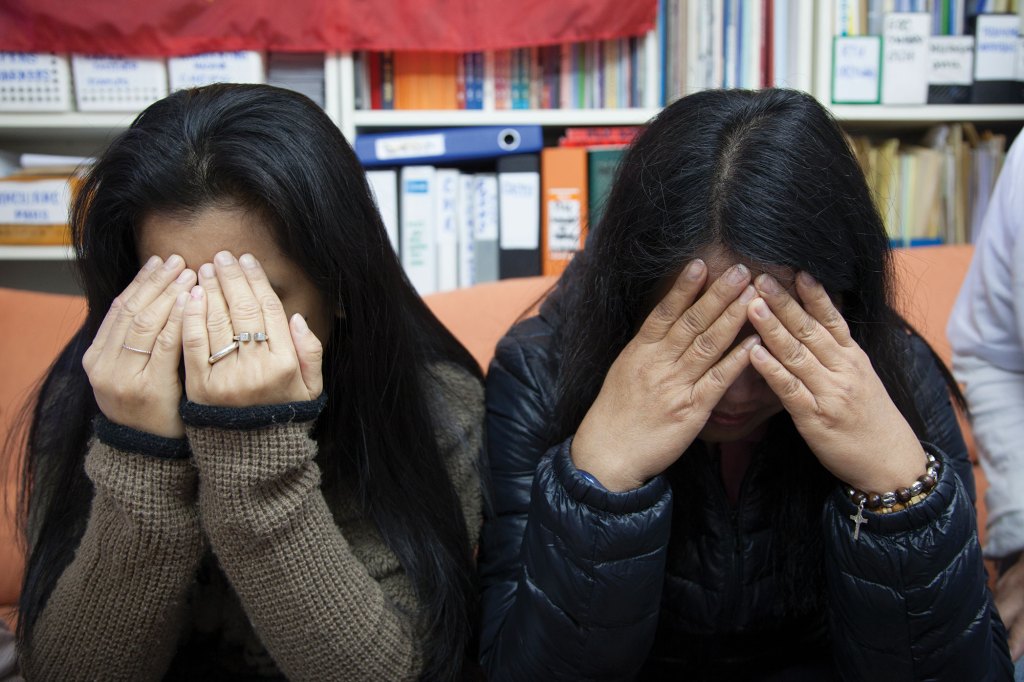This story appears in the April issue of VICE magazine. Click HERE to subscribe.
When Nicole* ran to the elevator of a glitzy high-rise stretching over Hong Kong Island with her back bleeding from nail scratches, she decided that, this time, she would never look back. She had survived slaps to the face, shrill screams in her ear that she was “disgusting” and “stupid,” and months of insomnia. Normally, she prayed to God and thought, Help me, Lord, to make it through. But this was the worst day of her life.
Videos by VICE
Just minutes earlier, Nicole had been preparing lunch for the family she worked for, as she had done every day for a year. Her boss—a stay-at-home mother of two, who spent her days watching over her employee—accused Nicole of cooking with dirty water from the cutting board. Nicole said that the woman snapped, pushed her to the ground, dragged her by her arm to the door, and threw her beaten body out of the apartment.
Nicole, who emigrated from the Philippines—like some 165,000 other foreign domestic workers in Hong Kong—recalled that day in January, shaking with tears. “The officer checked my body, and I didn’t know there was a wound on my back,” Nicole said, sitting on a bench tucked into the quiet courtyard of St. John’s Cathedral, steps away from Hong Kong’s frenetic financial district. “This was an injustice—I did not deserve this,” she said.
But Nicole’s story of horrific abuse isn’t unusual. In Hong Kong, where women pour in to take jobs helping families as domestic workers, Nicole’s experience is just one of many. While most come for cash to support their families from abroad, many easily find themselves trapped in a cycle of violence and debt.
About half of Hong Kong’s foreign domestic workforce is Filipina. Most others come from Indonesia—about 150,000—while a small percentage comes from across South and Southeast Asia. In total, there were 336,000 registered foreign domestic workers in Hong Kong as of July 2015. The Hong Kong government finds that one in three households with children employ a foreign domestic worker.
These women are not paid by the same wage standards as domestic workers who are native to Hong Kong, but are instead paid the minimum allowable wage once a month, currently set at about $550. Working hours are not regulated, but one day a week is allowed for rest—usually Sundays, when thousands of women sit atop cardboard in Hong Kong’s public parks and walkways. Many evacuate by nightfall, though, to be home before the curfews set by their bosses.
But perhaps the most problematic issue for domestic workers coming to Hong Kong is that the law states they must live with their employers; their visas are dependent on it. A foreign domestic worker “should only provide full-time, live-in domestic services at his/her employer’s residence and to serve the number of members of the employer’s household,” according to the Immigration Department’s website. “Request for the FDH [foreign domestic helper] to live out will not be granted.”
“The live-in arrangement is the root of many problems,” said Elizabeth Tang, general secretary of the International Domestic Workers Federation. “Basically, there’s no choice [for the domestic worker], and everything is invisible. It exposes domestic workers to possibilities of exploitation,” she said, adding that the organization regularly hears of workdays lasting up to 16 hours.
Help for Domestic Workers (HELP) aided Nicole with her police complaint, but her former employer filed a countercomplaint that Nicole stole two designer wallets and a camera—without any evidence. “It’s common for employers to have these kinds of allegations of theft, and it comes out of nowhere to avoid payments [to the domestic helper],” said Holly Carlos Allan, the executive director of HELP, who verified that Nicole has an open claim with the Hong Kong police. “Some of our clients have experienced being told by the police that it’s a simple matter, and that if they confess they can go home.”
For Grace Estrada, a Filipina domestic worker and the chairperson of the Progressive Labor Union of Domestic Workers (PLU), the live-in rule is downright dangerous. “It’s slavery if you force the worker and the employer to sleep together in the same place,” she said. “It’s 24 hours on call.” Estrada’s union is a small, loose coalition of domestic workers who meet on Sundays in a tiny apartment in Kowloon’s Austin neighborhood to discuss everyday issues, ranging from debt bondage to physical and psychological abuse.

Grace Estrada is a Filipina domestic worker and chairperson of the Progressive Labor Union of Domestic Workers (PLU), a coalition of workers that meets on Sunday, the women’s only day off, to share experiences and issues. Photos by Philipp Engelhorn
Foreign domestic workers were not always required to live with their employers. According to Tang, when the SARS epidemic roiled Hong Kong in 2003, the government—faced with rising unemployment—created this stipulation to prevent foreign domestic workers from taking any potential part-time jobs away from natives. “Those from outside had to be live-in helpers, while those from Hong Kong could be part-time helpers—drawing a line to protect job opportunities for local women,” Tang said.
Living in close quarters under a mostly unregulated system can spark a powder keg of abuse. “Physical assault cases are common, and so are cases of verbal assault,” said Allan. “The live-in arrangement makes workers vulnerable to abuse and lack of privacy.”
Estrada alleged that her first employers made her wake up every two hours at night to check on their child’s water glass. She and two other PLU members reported hearing stories of traumatic abuse at the hands of employers: a woman forced to sleep on a dryer while her employer would turn it on at night, the heat and shaking keeping her awake; one whose employer stayed home and watched pornography in his boxers while she worked; and another who was forced to sleep on a windowsill. These women wished to remain anonymous, and any records of police reports are protected by the Personal Data (Privacy) Ordinances.
“The employer has all the control,” said Rowena Borja, the PLU secretary. Borja said that her former employer often kept her up until 3 AM and refused her legal holidays. “She was always shouting at me. I had a nervous breakdown.” The PLU, together with the Alliance of Progressive Labor–Hong Kong, conducted its last major survey in 2012, and from interviews with more than 1,500 Filipino domestic workers, it found that they work 15.6 hours per day on average, usually starting at 6 AM and running until 11 PM.
“There’s no proactive monitoring of what’s stated in the worker’s contract and what the migrant worker is experiencing—there’s very little holding employers to account,” said Jade Anderson, an anti-human-trafficking coordinator at the Justice Center Hong Kong.
A spokesperson for the Labor Department said by email that the “government and the community will not tolerate any abuse of FDHs, and will thoroughly investigate into all reported cases and promptly take out prosecution if there is sufficient evidence.” The department also said that it has worked jointly with the consulate generals in Hong Kong to run public activities to “ensure FDHs are aware of their employment rights and channels for seeking assistance.”
Still, for some foreign domestic workers, the answer is living out—illegally, against the provisions of their unique dependent visas—in what are colloquially called “boarding houses.” These small but crowded apartments abound through the territory, with bunk beds rented on the cheap, usually by Filipino landlords. But living out raises another deeply challenging set of problems to grapple with.

The PLU and other organizations have made headlines representing women abused by their employers. The union has campaigned against laws requiring foreign domestic workers to live in.
Bing* shares a one-bathroom apartment with ten other Filipina domestic workers. “We have to work it out,” she said. The women live two or three to a room. Her employers, an expat couple, give her about $190 a month to pay for one of the bunk beds there. But Bing said the couple often refuse to give her taxi fare back to the boarding house, which she can’t afford on her salary, after forcing her to babysit past midnight. She said it’s still better than her former employers, where she lived in—she claims they only gave her their leftover food to eat.
“I start my job at 5 AM. I had the option of living out, but I couldn’t start this early,” said Ida*, highlighting that having to commute, on top of domestic workers’ long working hours, can be close to impossible. There’s also the regular fear of the police and immigration: If a boarding house is raided, its occupants face deportation. Bing’s landlord, she said, is a Filipina having an anxiety-fraught affair with a Chinese man who owns the property. Estrada said that this rental arrangement is not uncommon. “Filipino residents working in Hong Kong take the flat, divide it into rooms, and rent them.”
Most organizations advocate for foreign domestic workers to have a choice whether they live in or out. The PLU has been campaigning for this option and has met repeatedly with the Hong Kong government, but “we’ve seen zero progress,” said Estrada. The union said the government fights its argument on the grounds that if foreign domestic workers could live out, then they might only work part time—which could lead to them taking advantage of visas. “We’ve argued so many times—how can we do part time if we wake up at five in the morning and finish at 11?” said Estrada.
The PLU met with various representatives from the government’s Labor Department last May and also the Hong Kong Confederation of Trade Unions in February—and both used another similar argument holding up the live-in policy, Estrada said. Representatives told her that if migrant domestic workers are allowed to live out, they might roam around at night or work at bars and clubs.
“Any change to the ‘live-in requirement’ that FDHs must reside in employers’ residences will go against the rationale for importing FDHs and the fundamental policy that local employees should enjoy priority in employment,” a spokesperson for the Labor Department told me by email.
Last year, the Hong Kong government passed a new rule to protect foreign domestic workers from cleaning high windows; in January of this year, it announced a code of practice for employment agencies. But little else has been done at the top level to ensure the workers’ basic human rights. “There’s a lack of acknowledgement that what migrant workers do is work—that it’s a valuable contribution to Hong Kong,” said Anderson, drawing on the Justice Center’s interviews with foreign domestic workers. “Many talked about a general lack of respect for them as people—they were told what to wear, when they could go to the bathroom, and criticized for everything.”
In March 2016, Anderson co-authored a report that found that 17 percent of more than 1,000 foreign domestic workers experienced conditions tantamount to forced labor. According to the Justice Center’s interviews, these women were working and living under duress. They were on call day and night, their wages were manipulated, and their identity documents were confiscated. Employers also purposely isolated them, in many cases, allegedly taking away their cellphones.
Why foreign domestic workers stay trapped within this system of abuse is nuanced. The Hong Kong government only allows them to stay in the city for two weeks if their contracts are terminated—often deterring women from reporting severe cases of abuse. Beyond that, many are caught in spiraling debts to the employment agencies that brokered their contracts and are meanwhile breadwinners for their husbands and children in their home countries.
“We’ll head back to the Philippines alive and kicking, but without money and without husbands,” said Borja, the PLU secretary, adding that with years of distance the men often lose interest and find lovers. “It’s back to zero.”
As she waits to see if the police will press charges against her or her employer, Nicole is staying in a bare-bones shelter funded by the Philippine consulate with little to do during her days and no source of income.
She’s still sending money back home to Davao City, Philippines, even though she’s indebted to her employment agency for upward of $1,000. But Nicole is too afraid of the shame in telling her friends and family she lost her job in what they still perceive to be a glamorous Hong Kong, a place bursting with moneymaking opportunities and social mobility.
“I sent money to buy milk and medicine—my child is sick now with a fever. I thought Hong Kong was the right place for the helper,” she said, her face covered in tears. “I thought so.”
* Names have been changed to protect the identities of the subjects.




